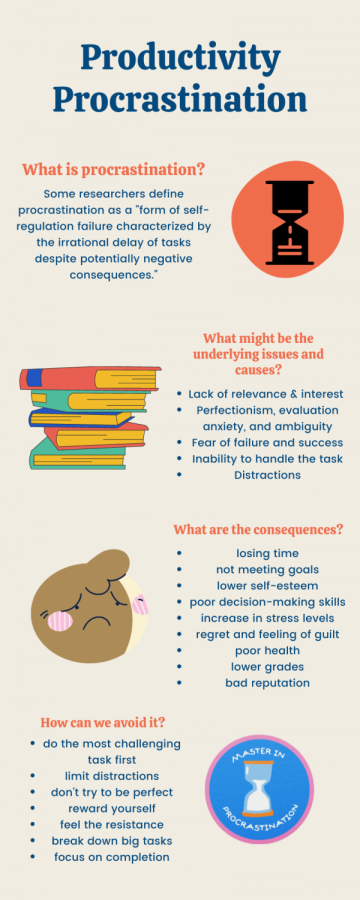Students battle against procrastination in an online learning environment
March 26, 2021
Being productive influences the education and success of students. According to S&P Global, both students and adults struggle with productivity as it requires time management, focus and motivation. During the pandemic of COVID-19 and quarantine, online learning is requiring a large amount of independent work which is causing more students to struggle to be productive and stay focused.
When a student lacks motivation, they usually procrastinate. According to Piers Steel, the author of the book “The Procrastination Equation: How to Stop Putting Things Off and Start Getting Stuff Done,” procrastination is voluntarily delaying a task despite knowing the consequences that follow.
“I procrastinate sometimes, but I try my hardest not to,” freshman Jessica Davis said. “I like to be involved with a lot of different activities, such as sports and clubs, so I usually have a lot to manage. It’s not so much procrastinating, but needing to prioritize things better.”
Procrastination manifests in people in a variety of ways, leaving different effects and repercussions for each person. For several students, procrastination comes to them naturally and for other students, they can’t resist the temptation even though they are aware of their priorities and needs. Brown University says some people procrastinate by underestimating the work involved in the task, overestimating abilities and resources in relation to the task, repeating minor delays or dramatizing a commitment to a task.
“There are times that I feel like I don’t want to work or the task seems too long, so I tell myself I will do it later and just end up staring at my computer without actually doing anything,” junior Gitika Gorthi said.
According to Psychology Today, procrastination also comes with a set of consequences students have to go through. Students who procrastinate usually experience a drop in their grades, leading to a decline in school success. Some of them are associated with evoking emotional and psychological pressure including stress, regret and painful feelings.
“I feel a slight anxiety when the deadline draws closer and very anxious when I know I’ve waited too long,” freshman Tanisha Lanka said. “ I deal with procrastination by staying up to finish an assignment or ask my friends for help.”
Focusing and motivating oneself prevents procrastination in the future. An article from Penn State University states that students are able to learn and understand the material more thoroughly rewarding higher grades and successful life. Students are also satisfied when looking back at what they have finished while also keeping both the body and mind healthy.
“Being productive helps me complete necessary work in an efficient, meaningful way, leaving me more time to do what I enjoy, such as sports,” Davis said. “When I procrastinate, on the other hand, I am rushing to finish rather than learn about the material.”
During the lockdown due to COVID-19, all FCPS students had to take online distance learning courses. In a study by the Institute for Research Excellence in Learning Sciences in Taiwan, the overall conclusion was that procrastination negatively impacts self-regulated online learning. Distance learning has been concluded ineffective when students procrastinate compared to the students who are productive.
“In virtual learning, you often have more time to submit assignments because you don’t have to physically turn them in in class, just submit by midnight,” Lanka said. “I’d say there’s an increase (student procrastination levels) from in-person to virtual.”
According to MindTools, there are several ways to prevent procrastination and stay on top of being productive. Changing the mindset and giving rewards when finishing each task is a way to keep oneself motivated. Minimizing distractions and using applications like Cold Turkey stop students from drifting away from finishing their tasks.
“I try to split assignments I do every day and limit my homework time so I don’t get stressed and can get everything I want easily,” Gorthi said. “I basically created attainable goals instead of unrealistic expectations for myself.”




